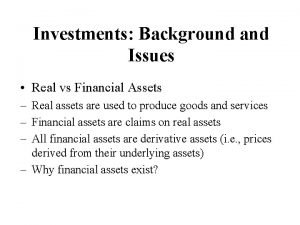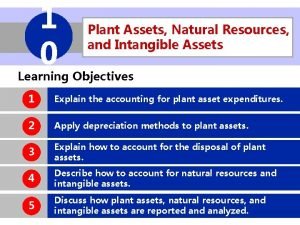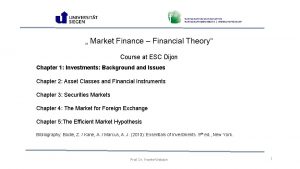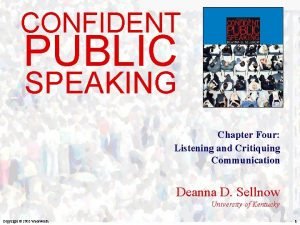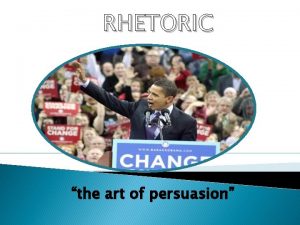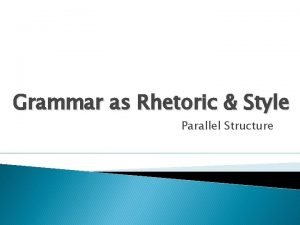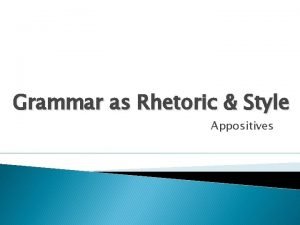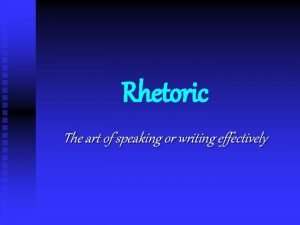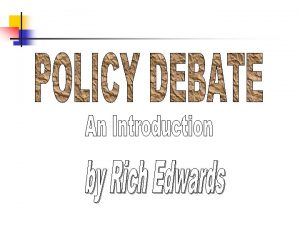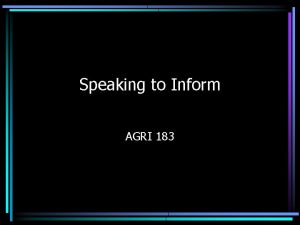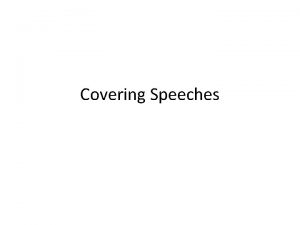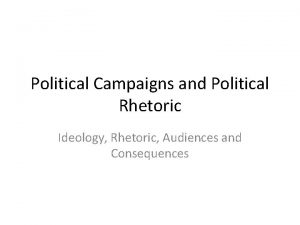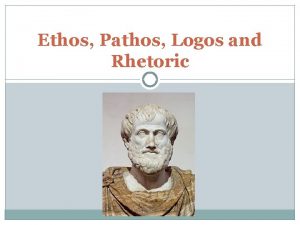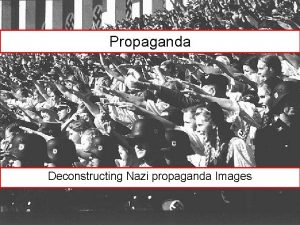RHETORIC AND PROPAGANDA IN POLITICAL SPEECHES ASSETS SESSION

















- Slides: 17

RHETORIC AND PROPAGANDA IN POLITICAL SPEECHES ASSETS SESSION 7 – MARCH 19, 2015

PATHOS • Pathos – relies on EMOTIONAL appeals. • Usually lots of vivid sensory details (imagery – vivid descriptions) to awaken the senses and manipulate emotions.

ETHOS • An ethical appeal by focusing on the qualifications of the speaker or character of the speaker. • The credibility of the speaker is supremely important with this appeal.

LOGOS • Uses logic, facts, reasons, statistics, data, and numbers to persuade. • The speaker uses logical appeals, so she will avoid inflammatory language and he will be sure to connect his claim to evidence. • Some examples – test results, research findings, eyewitness testimony, statistics, facts, causeeffect

GEORGE W. BUSH: 9/11 ADDRESS TO THE NATION Please click the image to watch the video.

ETHOS, PATHOS, OR LOGOS? • Which rhetorical appeal is mainly used by the speaker in this speech? • Ethos • Pathos • Logos Please provide at least 1 piece of text evidence to support your answer.

S - SPEAKER • Who is the speaker? • What makes him an important person? • What qualifications does he have that would make people want to listen to what he has to say?

O - OCCASION • What was happening in the world that required this speech being given?

A - AUDIENCE • Who was this man’s intended audience? • What do they know? • What do they need to know? • What message might they be hoping to hear?

P - PURPOSE • What did the speaker hope to accomplish by delivering this speech?

S - SUBJECT • What is the topic of this speech? (This is different than the occasion/context. )

TONE • What is the speaker’s attitude toward the day’s events? • What is the speaker’s attitude toward the audience?

QUESTION 1 • Why does the speaker use sensory images in paragraph 2? A. He is stressing the importance of offering victims’ families condolences and support in this difficult time. B. He is acknowledging the emotional turmoil of the American people in order to empathize with them and reassure them about the country’s status. C. He is trying to frighten the American people into declaring war on those responsible. D. He is emphasizing the volume of attacks on the US throughout the day, and reminding people that they were successful in wounding our country.

QUESTION 2 • In which quote does the speaker use diction to encourage the audience, promote patriotism, and support the primary message of his speech? A. “Today, our fellow citizens, our way of life…came under attack in a series of deliberate and deadly terrorist acts. ” B. “Federal agencies in Washington which had to be evacuated today are reopening for essential personnel tonight, and will be open for business tomorrow. ” C. “The search is underway for those who are behind these evil acts. ” D. “This is a day when all Americans from every walk of life unite in our resolve for justice and peace. America has stood down enemies before, and we will do so this time. ”

QUESTION 3 • Why does the speaker conclude the article by saying, “Good night, and God bless America? ” A. The speaker is appealing to the audience’s logic and rational thinking. B. The speaker wants to remind his audience that he is the President of the United States. C. The speaker is appealing to the audience’s sense of patriotism. D. The speaker wants to remind his audience that he is religious, just like them.

QUESTION 4 • Read this sentence from paragraph 7. “We will make no distinction between the terrorists who committed these acts and those who harbor them. ” The author makes this statement to suggest that – A. all terrorists look alike. B. this attack was a result of many different terrorist organizations coming together as one. C. the US will punish the terrorists responsible and any country that has allowed terrorists to thrive within it. D. the US will not tolerate political leaders who condemn this attack.

What is the common message of these political cartoons? How does this message compare or contrast with the way the American people most likely viewed President Bush immediately following 9/11?
 American rhetoric 100 speeches
American rhetoric 100 speeches Plant assets natural resources and intangible assets中文
Plant assets natural resources and intangible assets中文 Types of real assets
Types of real assets Plant assets natural resources and intangible assets
Plant assets natural resources and intangible assets Real and financial assets
Real and financial assets Plant assets, natural resources, and intangible assets
Plant assets, natural resources, and intangible assets Real assets vs financial assets
Real assets vs financial assets Real assets versus financial assets
Real assets versus financial assets Famous speeches with ethos pathos and logos
Famous speeches with ethos pathos and logos Sier model of active listening
Sier model of active listening Rhetoric: the art of persuasive writing and public speaking
Rhetoric: the art of persuasive writing and public speaking Faulty parallel structure
Faulty parallel structure Appositive rhetorical definition
Appositive rhetorical definition It is the art of speaking and writing effectively
It is the art of speaking and writing effectively Night structure
Night structure Structure of a debate
Structure of a debate Occasion speeches
Occasion speeches Speeches about objects examples
Speeches about objects examples




